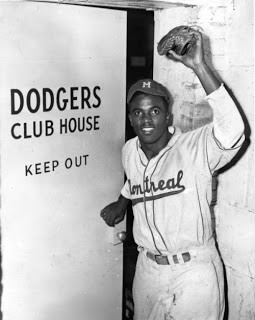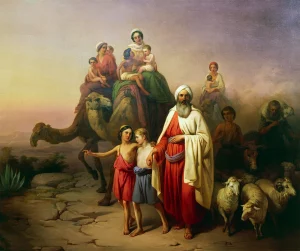"I think I can play in the big leagues. All I am asking for is the opportunity. If I fail, I'll step aside and try to so something else." - Jackie Robinson1Jackie Robinson, a man of courage, determination, and record-breaking events, was born on January 31, 1919, to a single mother who raised him along with four other siblings. This little boy grew up to change the views and opinions of African-Americans playing baseball in the Major Leagues. Jackie Robinson became the figure that would embody African-Americans competing in “a white-man’s game” and broke through that barrier of racism. Through the years growing up, Jackie competed against his older brother, Matthew Robinson, in whatever game they were playing. His older brother competed in the 1936 Berlin Olympics in the 200-meter dash, winning a silver medal just behind Jesse Owens. Matthew was the person who inspired Jackie to pursue his talents and to dream big. That is exactly what younger brother Jackie Robinson did, despite the racial controversy that lay ahead.

Jackie Robinson attended UCLA and became the first student athlete to win varsity letters in all four sports: baseball, basketball, football, and track. Unfortunately, in early 1941, just shy of graduation, Robinson left college “convinced that a college degree would not help a black man get a job during the Great Depression.”2 In the fall of 1941, Jackie moved to Honolulu, Hawaii to play football for a Semi-Professional team called the Honolulu Bears. Sadly, Robinson’s season was cut short due to his enlistment into the Army for World War II. He served in the Army from 1942 to 1944, ranking as high as 2nd Lieutenant. After being honorably discharged from the Army, Jackie Robinson’s life changed the world forever through the sport that he least excelled in, baseball.

The baseball world dealt with its own segregation views. “Segregated baseball showed the great injustice of Jim Crow, yet the Negro Leagues (the generic name for the organized black major leagues from 1920 through the 1940’s) also provided opportunities for black players, executives, and towns to thrive in unequal United States.”3 Jim Crow laws were laws that segregated facilities into white and African-American, and were common throughout the South. The game of baseball in the South only allowed White participants, players, and fans. African-American players, fans, and owners were denied and treated unjustly because of the color of their skin. “Tradition, based on deep-seated racial views of African Americans as inferior in sport, indeed, in all aspects of life, turned out to be the biggest barrier to integration.”4 Jackie Robinson broke these barriers with the help of a man named Branch Ricky.
In 1943, Branch Ricky was the president and general manager of the Brooklyn Dodgers. Ricky believed in Jackie Robinson and knew how talented he was. He wanted Robinson to be out there on the field with other Major League Baseball players, where he belonged, with the best. Branch Ricky was determined to erase the color line in baseball, and he knew Jackie Robinson would be the perfect candidate for this goal. “At the historic interview of August 28, 1945, Robinson expected to be signed to a Brown Dodgers contract but Ricky soon showed his cards. He wanted Robinson to sign with the white Dodgers and become the man who would erase the national pastime’s color line.”5 The famous dialog between Branch Ricky and Jackie Robinson started with Robinson asking Ricky a question that foreshadowed the type of player he would be in the years to come: “‘Mr. Rickey,’ asked Robinson, “do you want a ballplayer who’s not afraid to fight back?’ No, Replied the Dodgers’ president, ‘I want a ballplayer with guts enough not to fight back.’”6

A few months later, in February 1946, Robinson and his newlywed wife, Rachel Isum, his college sweetheart, traveled to Daytona Beach, Florida for the Royal’s spring training camp. “Staring down Jim Crow at Daytona Beach’s City Island Ball Park on March 17, 1946, in an exhibition between the Royals and their big league affiliate, the Dodgers, Robinson became the first black player since Moses Fleetwood Walker in 1888 to take the field against a major league team.”7 Although Robinson was known for being great at baseball, he had a slow start. During camp, when Jackie Robinson did not compete at the standard being set for him, commentators began to question his credentials and accused him of having special privileges. Without being discouraged, Robinson played the game he loved with respect and humility.
Despite how poorly Jackie Robinson was treated because of the color of his skin, he did not let other people’s opinions factor into his mindset. Teams did not want to play the Montreal Royals, because they had an African-American in the line-up. Players also tried to hurt Robinson when he was playing on the field. “In Buffalo, New York, Bison’s players spiked him as they slid into second base, knocking him out of the lineup for three weeks.”8 On April 15, 1947, playing the Boston Braves, Jackie Robinson became the first African-American to play in an official major league baseball game. The Dodgers would go on to win the National League pennant, and Jackie Robinson was named Rookie of the Year in the Major Leagues.

In the next two years, baseball began to slowly integrate; the pressure on Robinson began to ease up. Jackie Robinson went on to be known as one of the greatest baseball players of all time. He remained steadfast in his pursuit for justice and civil rights. He wrote letters to Presidents Harry S. Truman, Dwight D. Eisenhower, John F. Kennedy, and Lyndon B. Johnson thanking them for their support of civil rights. On October 24, 1972, Jackie Robinson died of a heart attack, at the age of fifty-three. His jersey number 42 was retired in 1997. In 2004, Major League Baseball proclaimed April 15th annual Jackie Robinson Day, where the players began to wear the number 42 in his honor. The tradition continues to this day.
- Thomas W. Zeiler, Jackie Robinson and Race in America: A brief history with Documents (Boston: Bedford/St. Martin’s, 2014), 80. ↵
- Thomas W. Zeiler, Jackie Robinson and Race in America: A brief history with Documents (Boston: Bedford/St. Martin’s, 2014), 3. ↵
- Thomas W. Zeiler, Jackie Robinson and Race in America: A brief history with Documents (Boston: Bedford/St. Martin’s, 2014), 6. ↵
- Thomas W. Zeiler, Jackie Robinson and Race in America: A brief history with Documents (Boston: Bedford/St. Martin’s, 2014), 9. ↵
- Thomas W. Zeiler, Jackie Robinson and Race in America: A brief history with Documents (Boston: Bedford/St. Martin’s, 2014), 17. ↵
- Thomas W. Zeiler, Jackie Robinson and Race in America: A brief history with Documents (Boston: Bedford/St. Martin’s, 2014), 17. ↵
- Thomas W. Zeiler, Jackie Robinson and Race in America: A brief history with Documents (Boston: Bedford/St. Martin’s, 2014), 20. ↵
- Thomas W. Zeiler, Jackie Robinson and Race in America: A brief history with Documents (Boston: Bedford/St. Martin’s, 2014), 21. ↵



87 comments
Rafael Lopez-Rodriguez
The story of Jackie Robinson is a story that many athletes look at as inspiration. All the barriers that Jackie Robinson broke is unbelievable. He opened the door to many athletes of color and sending a message that it does not matter what the color of your skin is, you can accomplish anything you set yourself to in life. For a baseball fan this is an amazing article to read because it goes a little beyond the life of this great sports icon and his impact on and off the baseball field.
Elias Garza
I have been playing baseball for as long as I can remember. Playing baseball brought joy to my family and I as they supported me. I can only imagine how proud Jackie Robinson’s family was after he went to the Major League. His journey to become a professional was not easy, and even after he made it to the League, he still experienced much racism. Because of his ability to stay focus on his own goal is the reason why I respect this man so much.
Reese Lujan
I love the way this article wasn’t just focused on Jackie Robinson and his obstacles of baseball. This article covered the struggles of all African Americans even the fans that were treated poorly for simply their love of the game. I would have never known his love for other sports but especially the love he obtains or baseball and the way he didn’t care for others peoples opinions and just kept moving forward to conqueror and reach his goal.
Kimberly Simmons
Truly an inspirational story, and very well written. Jackie Robinson broke through personal, societal, and racial barriers throughout his lifetime, despite all the obstacles thrown in his way. I had no idea that he was a football player in Hawaii, or that he was in the Army! This article uncovered aspects of his life separate from that of baseball, allowing the reader to gain a better understanding of who he really was. What amazes me the most is the fact that he kept pushing. Through injustice and poor treatment, he persevered. He is the definition of a true athlete and activist.
Zeresh Haman
This is a very well written and informative article. I think that this story is really inspiring, Jackie Robinson over came so much to achieve his dream. I did not know that he was in the army, he was truly a great person, who was able to handle everything that came at him grace and poise. I love the fact that they retired his jersey, and that there is a day dedicated to him. I love this article.
Clarissa Bustamante
Jackie Robinson was a huge role model for young African-Americans. He gave them the opportunity to see what happens when one person goes against all odds and achieve their biggest goal and also what an impact he made in the world; especially in the sports world. I think what helped enormously with the process Jackie Robinson had to go through in order to play the sport he loves, was that Branch Ricky had so much confidence in him ad he would always be there for Jackie through the ups and downs.
Ashley Tumlinson
I love this article! I love how you go past baseball with it, you don’t stick to the typical ‘athlete’ story – you went above and beyond and it was fantastic. Since Jackie Robinson is a major figure in baseball is basically known for what he accomplished inside the diamond, you wouldn’t think he did something else with his life before then. It was really interesting to learn that baseball was his second sport. Had I not read this article, I wouldn’t have known this – it definitely put an emphasis on what a great athlete he was.
Carlos Aparicio
Amazingly detailed article! I personally have never been a baseball fan but whenever I hear the name “Jackie Robinson”, I think about all his hard work and dedication to the sports world. Jackie truly proved so many people wrong about himself and his entire race. The details were very informative because I never knew that Robinson was drafted to the war and that he even played football. Robinson is a true American hero.
Joel Gracia
This article was extremely informative. I hate to admit it, but the majority of what I knew about Jackie Robinson stemmed from the movie “42”. This movie, while pretty accurate, leaves out most things before his career in baseball. I had no idea that it was his second sport. He must have been a truly amazing and well rounded athlete in order to switch sports completely and still make the impact that he did in history.
Michael Mandujano
I enjoyed how this article went into depth about Jackie Robinson’s personal life outside of the diamond. In other words, I only knew Jackie Robinson as a stellar athlete in Major League Baseball. I was unaware of his enlistment into the Army during World War II. Overall, Jackie Robinson proved to be an inspirational individual, since he overcame racial discrimination.